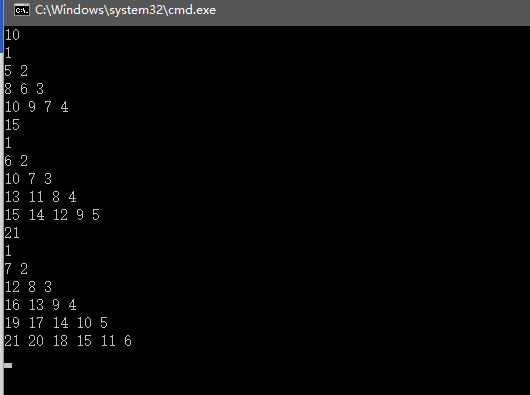随笔:递归的妙用<1>
2017-12-09 00:00:00
起因
昨天闲的蛋疼在百度知道回答问题,看到一个很有趣的题目,要求用递归实现如下的输出
1
5 2
8 6 3
10 9 7 4
想了一段时间, 自己写了个代码,差不多实现了这功能,却又懒得去优化一下。好久没做算法题目lower_bound的参数都记得不太清楚了,不过还好自己写出来的没错,程序成功运行。
代码+结果
代码如下
#include <iostream>
#include <algorithm>
#include <string>
#include <cstdlib>
#include <set>
#include <cmath>
#include <cstdio>
#include <cstring>
#include <vector>
#include <map>
#include <stack>
#include <queue>
#include <cctype>
#define LL long long
using namespace std;
const LL inf = 1e18;
const LL mod = 1e9+7;
int s[10] = {1, 3, 6, 10, 15, 21, 27};
int m;
void f(int n, int k, int cnt) {
if(n == 1) {
return;
}
else if(cnt == 0) {
cnt = m - k - 1;
k = m;
f(cnt + 1, k, cnt);
printf("%d\n", cnt + 1);
}else {
f(n + k, k - 1, cnt - 1);
printf("%d ", n + k);
}
}
int main() {
//1 3 6 10 15 21 27
//1 2 3 4 5 6 7
//s = (1 + n) * n / 2
int n;
while(scanf("%d", &n) != EOF) {
int k = lower_bound(s, s + 7, n) - s;
m = k;
f(k + 1, k, k);
printf("%d\n", k + 1);
}
return 0;
}
结果如图
小结
有时间做做这类型的题目也很有意思,锻炼一下思维还是有好处的,这个写的比较烂,如果有更好的方法,不如说出来大家共同探讨一下。
